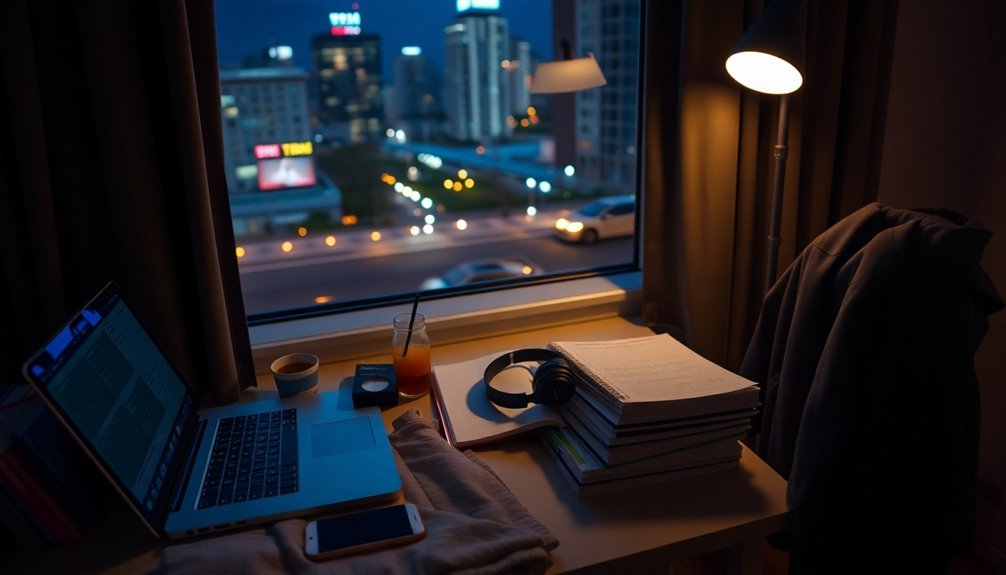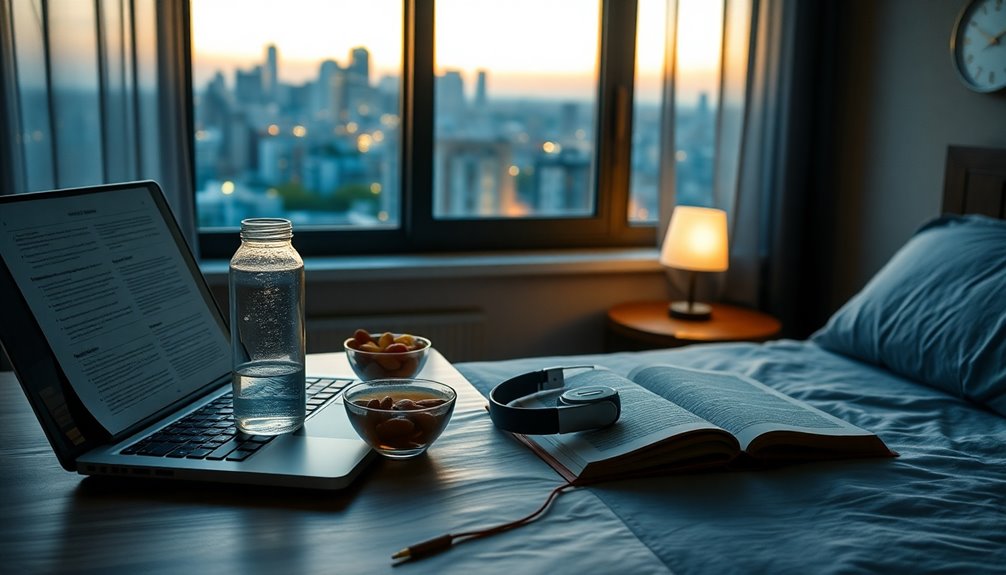
You can enjoy nights out and still meet study goals by blocking non-negotiable core study hours each week and communicating them to friends. Pick social nights that recharge you—low-key concerts or creative meetups—and set end times so you can unwind. Squeeze in short micro-study sessions daily using flashcards or quick drills to keep progress steady. Turn socials into low-pressure English practice with simple goals, then prioritize sleep, nutrition, and a concise review to bounce back quickly; keep going and you’ll find practical routines that fit.
Highlights
- Block fixed weekly core study hours and treat them as non-negotiable appointments.
- Choose social outings that recharge you and set a clear endpoint to preserve energy.
- Use daily micro-study sessions (5–20 minutes) to maintain language progress and consistency.
- Turn low-pressure social nights into English practice with simple goals or mini language games.
- Recover quickly with prioritized sleep, nutrient-dense meals, and concise active-review sessions.
Set a Weekly Schedule That Protects Core Study Hours
When you map out your week, block out core study hours first and treat them like non‑negotiable appointments — they’re the foundation that keeps nightlife from eating into your progress. You’ll use a weekly planner to carve consistent study time that fits your energy peaks, then build fun around those blocks. Decide which days need longer focus and which can handle lighter review. Communicate boundaries with friends so your freedom isn’t lost to last‑minute plans. Stick to the schedule for a few weeks, tweak as needed, and you’ll protect momentum while still enjoying nights out without sacrificing goals.
Choose Nightlife Outings That Recharge, Not Drain
Once your study blocks are locked in, pick nights out that actually help you recharge instead of leaving you wiped the next day. You don’t have to say yes to every invite—make mindful choices about who you hang with and what you’ll do. Opt for energizing activities: a low-key concert, a walk with friends, or a creative meetup that sparks ideas without draining you. Set an endpoint so you can unwind properly afterward. Treat nights out like planned refreshers that support your goals; that freedom to choose helps you enjoy life and keep study momentum without burnout.
Use Micro-Study Sessions to Maintain Language Progress
Although you might not have hours to study every day, squeezing in short, focused micro-sessions keeps your language skills alive—ten to fifteen minutes of targeted practice can beat an occasional long cram. You can use micro learning techniques on your phone: vocab flashcards, a quick grammar drill, or listening to a tiny podcast while you brew coffee. Aim for consistency, not intensity, so study feels like a freedom-friendly habit, not a chore. Rotate tasks to mimic language immersion—reading a paragraph, then shadowing a sentence, then noting a phrase. Small wins compound, and you’ll stay moving forward.
Turn Social Nights Into English Practice Opportunities
If you’re out with friends, you can quietly turn the evening into low-pressure English practice without killing the vibe—choose a few simple goals like introducing a new word, asking follow-up questions, or summarizing a story you heard earlier. Blend practice into conversation: swap short role-plays, suggest a mini language game, or propose a casual language exchanges exchange with someone who wants your native tongue. Hunt for themed events or quizzes that match your interests so learning feels like leisure. Stay flexible: aim for small wins, laugh off mistakes, and let social nights fuel relaxed progress without pressure.
Recover Fast: Sleep, Nutrition, and Focused Review

Social nights can boost your speaking confidence, but the next morning you’ll get more from study if you recover smartly: prioritize sleep, refuel with nutrient-dense food, and plan quick, focused review sessions that lock in gains. You’ll sleep better if you follow sleep hygiene: cool room, dim lights, and a wind-down routine. Use nutrient timing to eat a balanced breakfast and small protein-rich snacks to steady energy and clarity. Keep review concise—15–30 minutes of active recall or spaced repetition. Protect freedom by choosing recovery habits that suit your lifestyle and help you bounce back fast.
Some Questions Answered
How Do I Handle Guilt After Missing Study Time for Nightlife?
Own it: forgive yourself, learn, and move on. You’re allowed fun and mistakes; guilt management means acknowledging feelings, reframing the night as a choice, and deciding what matters next. Use time prioritization to schedule catch-up blocks and more realistic plans—swap perfectionism for progress. Be practical: set a short recovery study session, adjust future outings, and treat yourself kindly. This keeps freedom and responsibility in balance without self-blame.
Can Late-Night Socializing Boost Long-Term Creativity?
Sure — yes, late-night socializing can boost long-term creativity, if you don’t treat every party like a muse-hunting safari. You get social stimulation that shakes loose stale ideas and sparks creative inspiration through unexpected conversations. Don’t rely on nightlife alone: balance it with focused work, restful sleep, and reflection. Let spontaneous nights feed your curiosity, then capture and cultivate those sparks into lasting projects you actually follow through on.
How Do Roommates Affect My Nightlife-Study Balance?
Roommate dynamics directly shape your nightlife-study balance by influencing noise, routine, and social invites; social influences can pull you out or help you focus. Talk openly about boundaries, set quiet hours, and design shared routines that honor freedom while protecting study time. Trade favors—late nights now for morning quiet later—use earplugs or solo study spaces, and celebrate small wins so you both feel respected and free.
Is It Okay to Study Hungover or Sleep-Deprived?
You can, but it’s not ideal: study effectiveness drops when you’re hungover or sleep-deprived. Be practical—prioritize urgent tasks, use active recall, and avoid deep learning that needs focus. Try hangover remedies like hydration, light food, and caffeine to steady you, but don’t rely on them. If freedom’s your goal, plan nights so you’re rested for big tasks, and allow recovery time so your study effectiveness stays high.
When Should I Stop Nightlife to Prevent Burnout?
Imagine your energy like a battery meter flashing red — stop nightlife when that meter dips consistently. You’ll set nightlife limits by noting burnout signs: chronic tiredness, irritability, dropping grades, or lost joy. Trust those signals, plan sober nights for recovery, and keep one or two late nights weekly so you still feel free. You’ll feel clearer, more energized, and able to enjoy nights without burning out.
Summing Everything Up
You can party and still pass — but you’ve got to pick your nights and protect your hours. When laughter replaces lecture and late drinks follow early deadlines, balance isn’t luck, it’s a plan. Treat wild nights as rewards, not replacements, and use quick study bursts to keep skills sharp. Sleep, eat, and review with intention so fun and focus don’t fight; they team up, letting you enjoy now and succeed later.
